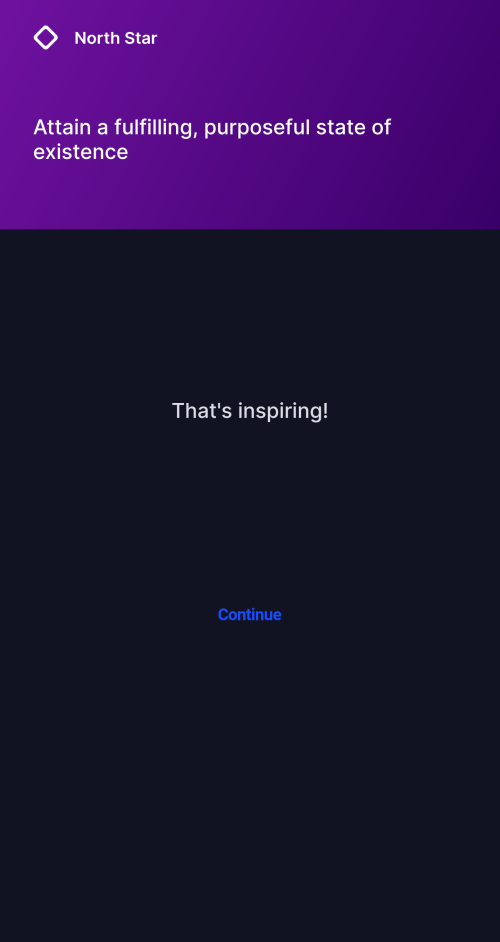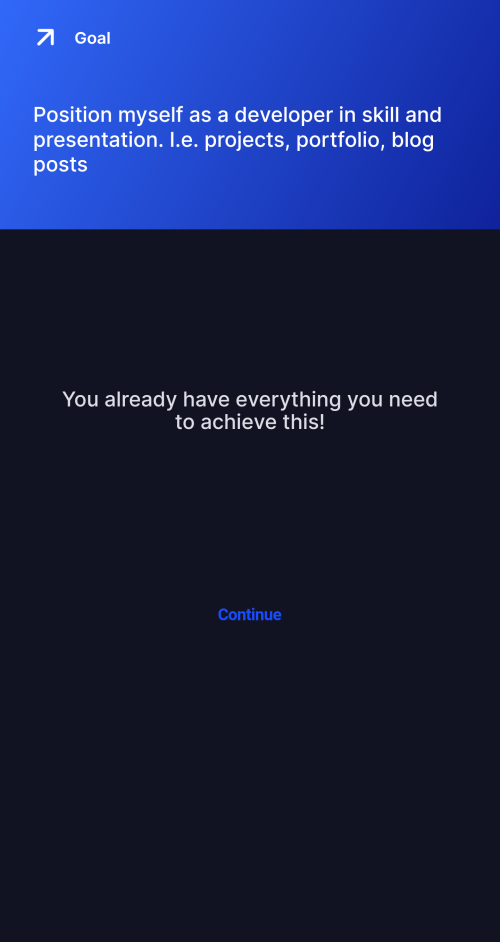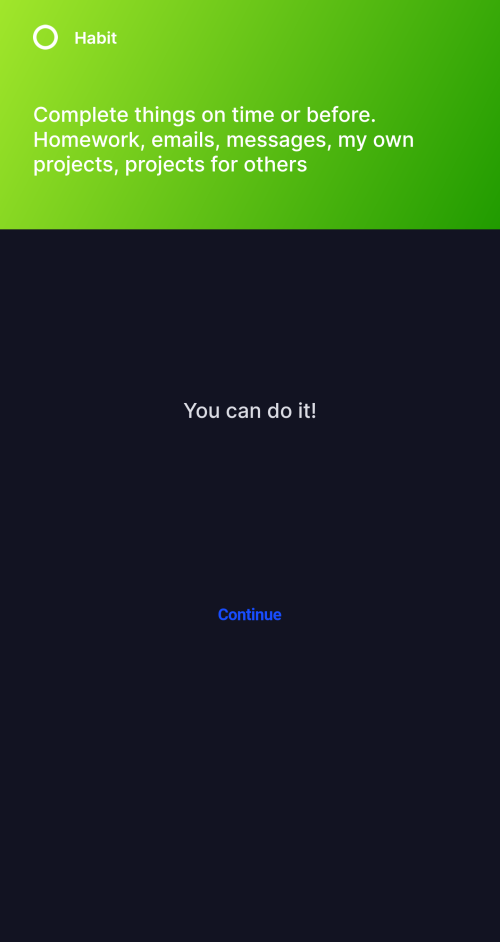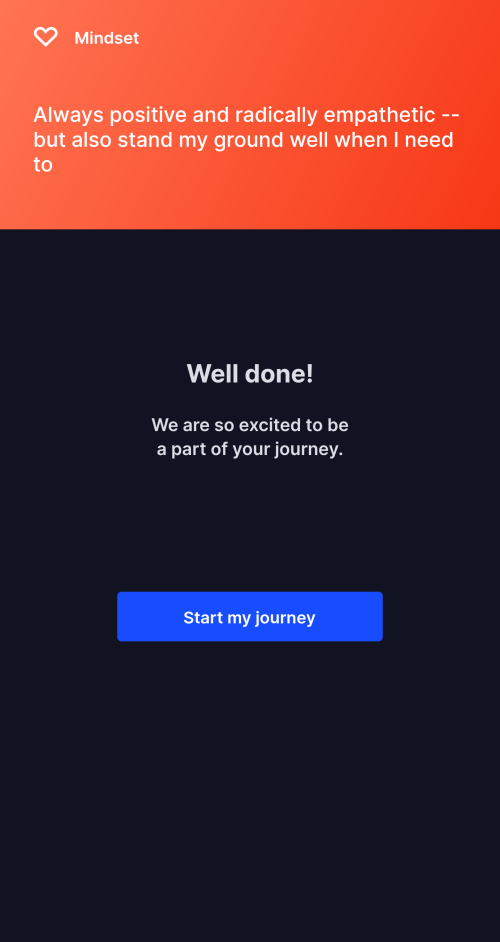“What do you truly want to accomplish before you die?” A goal-setting app that shares my life philosophy
11 min read
Today, I opened the Google Play Store on my phone, searched for a goal-setting app I had found through IndieHackers, and installed it. I opened it and was greeted by a standard onboarding experience; panels that slid by, a Google sign up button. Then, without warning, I was greeted with the following question:

Now, normally I’m skeptical of any digital goal-setting tools. I’ve tried Todoist, Trello, all sorts of things before. Sometimes, they’re incredibly useful, like for keeping track of work for The Phillipian, which involved managing a dozen different teams and subprojects at once. Most of the time, though, for personal task tracking, I find that digital tools just get in my way. They’re too powerful, too easy to use, too easy to get rid of tasks or add new ones. Something physical that takes more effort to change around keeps me much more grounded. At school, I use a planner and a scrap notebook that I keep with me whenever I can; locked at home, I use a big 3ft x 2ft whiteboard to keep track of my week.
Today, the IndieHackers newsletter arrived in my inbox; I clicked open a few links and deleted the email. One of them was at the top of the frontpage: "My answer to ‘Should you quit your full-time job to be an indie hacker?’ - after a year of being indie,” by Terry Xu (“My answer is a definitive ‘Yes,’” in case you were wondering about his answer). It was a good read, with some cool insights (“Launching a startup full-time is already hard. Doing it part-time requires MORE discipline to become successful, not LESS. So launching a successful start-up part-time is actually an ‘ADVANCED’ mode, not the 'EASY’ mode as I thought,” touching on some ideas of focused work and commitment that I had read/heard about in other places), but I was curious about what his product actually was that made him so optimistic. So, I clicked into his profile.
To my initial disbelief, I saw that his project was a task-tracking app. To even more disbelief, I saw that it had been featured on ProductHunt. What? Seemingly the most oversaturated app market in the world and he had managed to carve out a spot. How? The ProductHunt tagline gave me the first part of the explanation: “Priorities - A todo app for today and tomorrow only.” I read a quick blog post, citing an essay on productivity by a Venture Capitalist. Strip down and build around a concrete, novel productivity philosophy. It was cool functionality, and I began to see the value of it. But I still wasn’t convinced. There are tons of apps out there meant to revolutionize some traditional functionality that ultimately don’t end up being helpful enough to justify having another app on your phone or another account to get emails for. This is popular only because of productivity and app junkies, I thought, chasing every new tool available. Once I was among this crowd, but if anything I lean the other way now: towards minimalism, using the least amount of external tools possible, finding something good and sticking to it. I’ve even basically ditched my phone. This app is not for me, I thought.
Until I saw the promo video.
The simplicity of the app, how it enforced this today-and-tomorrow goal-setting pattern, the satisfaction of completing tasks, the joy and order it could bring to my life — it screamed at me, grabbed me through my monitor and the upbeat music in the background. I wanted this. I still refuse to use my phone for any regular functionality, so the Android and iOS apps were off the table. I couldn’t find a webapp, and considered messaging Terry and asking him to make one, or building my own clone. But, no, this is just getting caught up in the rush. I have my ways to keep track of my life, this is definitely not worth the effort. So I didn’t end up using the app; but I will now live in envy of not doing so.
Marketing is powerful, ha. I’m reminded of some of Peter Thiel’s writing about product and marketing in Zero to One. But I digress. After getting hooked on this app that I could not use, I returned to Terry Xu’s profile to check out his other product. Another goal setting/tracking app, this tmie for long-term goals and habits. Well. I was much less skeptical this time, as “Priorities” had convinced me that this man was committed to making things that were actually different and better than what existed. I was still skeptical of doing anything unnecessary on my phone, but hey, this was long term — less consistent usage. And while the other app’s promo material made clear its functionality, this time it seemed I would learn better by downloading the app and trying for myself. So, with high expectations and some enthusiasm, I did so.
That brings us now to the question that stared me down as described in the beginning of this blog post. For emphasis, here it is again.

Whatever I had ever expected from any app, this was not it. This was literally the onboarding process, the core value proposition for the entire usage of the app. And it wasn’t some surface level feature, some way to maximize productivity or health or even happiness. No. Essentially, “What is your purpose in life? What are your values: not only the ones that you live by, but the ones that you live for?”
Life is about values. Life is about choosing your struggles, not avoiding or minimizing it.1 Life is about the process, not the outcome. Life is an infinite game, and must be played as such.2 “You can’t ever reach perfection, but you can believe in an asymptote toward which you are ceaselessly striving.”3 It’s been said a million times in a million different ways; it’s the understanding of meaning that I strive to make the basis of my life. Here was an app that did the same. My high expectations, demands of something different and novel, had been absolutely shattered, and a few more layers than that, too, getting to some of my deepest-held beliefs. I was in love.
“If you can only choose one thing, what do you truly want to accomplish before you die?” Faced with this question, I sat down on my couch. An external nudge pushing me to self reflect and consolidate my life and thoughts; an almost always welcome opportunity.
My answer was somewhat less sharply soul-touching than the question.

“That’s inspiring!” …if you say so, lol. It’s really vague, because this is as far as I feel my reading, thinking, and living has taken me. Manson’s Subtle Art established what values are and how they’re fundamental to any part of life, but as he writes on his blog, he doesn’t go beyond that — that’s for his second and much less favorably reviewed book, Everything is Fcked*. Perhaps the unfavorability of this second book hints at Manson riding a wave of success and falling off in his writing, but perhaps it’s something bigger, about the idea of a universal framework for meaning itself. Existentialist philosophy — in particular that I’ve read, Kierkegaard and Sartre — define meaning in life almost by its absence: if there is a meaning to life, being trapped in our mortal subjectivities we may never know it, so the only meaning to life is what we create for ourselves. “Man is nothing but what he makes of himself.”4
That doesn’t mean that there isn’t thinking out there that can help me on the right track; but the line between meaningful content of this topic building off of an existentialist or value-based starting point and regressing to focusing on outcome and forgetting about process is a hard one to see, differentiable perhaps only by the intuition of experience. We don’t go straight to meaning. Kalanithi pursued medicine because he sought the meaning of life, and he sought the meaning of life because his mother stuffed him with literature; at the end, he found being a surgeon, essentially, to be the meaning of his life, choosing to operate through his terminal diagnosis until he couldn’t anymore. There are four stages to life, Manson writes: mimicry, self-discovery, commitment, and legacy. Kalanithi’s life fits neatly into this framework; I’m still working my way through mimicry and self-discovery, on my way to finding meaning to commit to.
What values do I want my life to be lived in service of? I don’t know right now. The purpose of my life right now is to continuously learn and think and seek out a larger meaning, so all I can say about where I hope to get in life is that I want it to be a “fulfilling, purposeful state of existence.” Maybe that means changing the world in some way, as a politician or an activist, an entrepreneur or CEO. Maybe it just means finding and surrounding myself with people that I love. On your deathbed, the scale of the world melts away; only your values are left.
Okay, that was the very first question of the onboarding. I’ve been reminded that I’m living a life, not an application process, not a school, not a career. What’s next?

Okay, a much more down-to-earth question. Before I explain my answer, let me back up a bit.
A few months ago, I “launched” YouTube Liberation. Really, it was just fixing a long-standing bug, creating some new promotional graphics, and putting it up on ProductHunt. But it was a realization of sorts that this was the crowd I wanted to be a part of: what ProductHunt calls “makers,” what IndieHackers calls “hackers.” I had always had vague ambitions of studying and working with computer science and entrepreneurship, with making things and starting side projects that a large amount of people would actually use. I had even lived the hacker mentality — “do to learn, not learn to do” — in my life and projects, be it learning filmmaking through my YouTube channel or WordPress by redesigning a newspaper website getting tens of thousands of views a month; but at other times it was a mentality I looked down on.
A parallel came up when working with/reading/thinking about journalism and accessible non-fiction vs. academic writing. On the one hand, journalism is incredibly powerful, alluring, and important. The path to get into the field is simply to start writing. Write for yourself, then get an internship at some publication and write for them, then jump from publication to publication higher and higher up, learning and making meaningful work along the way. “Don’t go to college for journalism,” nearly all of the journalists I’ve heard speak have said. It’s very reminiscent of the hacker entrepreneurial spirit. But journalism has its pitfalls; it’s easy to overlook things, to misrepresent things. It’s research from the top down rather than the bottom up, citing experts and more rigorous literature. For a research project, I ended up diving into some of this literature (Asian American studies), and fell in love with academia. It was knowledge creation in its truest form: not just setting out with energy, but also with the force and wisdom of as much of what has been done before as possible in the form of literature review, and adding on top of that a new framework to potentially push the entire field, and humanity’s entire understanding of itself, directly forward.
So I had the same nagging feeling that something was missing from indie software development, from entrepreneurship. All the talk about hustling, making money with side projects, building up skills — it seemed like it missed entirely the “why.” Why create? Why live? What was the alternative to this? Having known computer science as a very applied form of engineering in all the ways that I’ve interacted with it, rigorous computer science research feels like an oxymoron — but then again, engineering research is a thing, just one that I haven’t worked much with or understand.
On the other hand, more so than my other past ambitions of filmmaking or design, storytelling in the abstract, computer science just as a form of engineering felt like something comfortingly concrete and rigorous. Programming and development are things I’ve enjoyed a lot and have often been incredibly empowering. My own blog and website is a constant sandbox for learning and improvement. Tools like the aforementioned YouTube Liberation were things that just made my life, and the lives of my friends, better. Beyond this, engineering and development is a form of making things with real impact, not just for users but eventually driving forward technical boundaries, empowering humanity to do more and do better. This is not to dismiss creative work or civic work; certainly they can be just as necessary and impactful. I might go as far to say that, if I had the ability to do everything that I wanted, I would be driven to pursue these other paths equally as much. Perhaps the bias in my decisions and practical thoughts come down to conditioning by my parents, one a mechanical engineer and the other a software engineer.
For sure, this is an unresolved issue that I expect to understand with time. For now I just have to choose one direction and run with it, and the college application process has done just that for me. I’ll be studying computer science at Georgia Tech, which means I’ll be studying probably nothing but computer science for four years. Putting off its larger-scope value, I’m excited to dive in as rigorously as I can at one of the best computer science and engineering schools in the country. For the next few years, then, my development skills and computer science investment will probably be my greatest asset.
So, thinking about the various projects I’ve taken on, the ones I plan to take on, the blog posts I’ve been writing, internship opportunties, and preparing to get the most out of college, here’s what I answered as my goal:

“You already have everything you need to achieve this!” Haha, this is for sure true. Tons of amazing resources out there and project ideas lined up. Looking forward to pushing ahead.
There are two more questions.

At the start of my spring break/forever Coronavirus break, I set out a bunch of nice, concrete habits to achieve. Run three times a week. Sleep at midnight and wake up at 8. Write four pieces of creative writing a week. Practice piano six hours a week. Some of these were ambitious goals, but I set them to hit as many of them as I could — running I enjoyed and was able to, with Central Park right across the street. I competed with a friend, calculating a score each week.
Come lockdown, though, running went out the window. With the prospect of probably never seeing many of my friends in person again (not for any concrete barrier, but because relationships tend to fade with time, especially the ones I tend to build), I indulged friends with much worse sleep habits late into the night, and my own sleep schedule collapsed. With half of my goals out the window, the rest followed suit.
These goals were something like plus goals from the beginning — not doing them didn’t mean I would regress, just that I wasn’t fully meeting my ambitions, and my value-oriented approach to life meant I kept them firmly in mind. My life hasn’t collapsed, but the value of these concrete goals did a little.
This didn’t mean that I didn’t have habits, or longer term characteristics, that I wanted to strive for. Here’s what I answered:

Not one that’s easily tracked, i.e. not based on time frequency; but I think it qualifies as a habit, and it’s certainly one that I’ve struggled with and would improve my life a lot if I fixed. Not doing things on time is one bad habit I had identified and had in mind from previous self-reflections. Another candidate was speaking clearly, loudly, without “ums.”
The last question is somewhat similar.

I’ll go straight to my answer:

A very social-interaction-based type of mindset, but really, is that so different from an interaction-with-self mindset? What you think becomes what you say becomes what you do, and the other way around. Radical empathy — it’s a term I know has been written a lot about, that I haven’t read a lot about, but have appropriated it (for now) as a name for my own intuition and approach towards everything from personal relationships and managing team members to public advocacy and judging public figures. Understand the worst, but always assume the best of people;5 be radiantly positive and grateful, see opportunities out of problems. The bad doesn’t negate the good. At the same time, speak firmly. Be decisive and uncompromising at your core. The intersection of the two is a difficult place to find, but it’s where I want to be.
“We are so excited to be a part of your journey.”
As an app, “Goals” didn’t stay part of my life for much longer; after checking out the interface, my answers clipping out of UI elements because I really wasn’t supposed to write a three-line habit description, I deleted my account and the app. But the ideas embodied in the app, and the reflection session and meta reflection session in this blog post that it gave me, are for sure a part of my journey.
So, what can I say? Whatever my grander thoughts are, this world of makers and products is one that I plan to be a part of. Thank you, Terry Xu, for this app that I love but cannot use; but more than all of that, thank you for giving me an excuse to think and ramble about my life for a few thousand words 😛
Footnotes
-
Mark Manson, The Subtle Art of Not Giving A Fck* ↩
-
Simon Sinek, The Infinite Game ↩
-
Paul Kalanithi, When Breath Becomes Air ↩
-
Jean-Paul Sartre, “Existentialism Is a Humanism” ↩
-
Honestly I got this not from any book on management or value-based advice, but as a running theme in analyses of the YouTube channel Charisma On Command. ↩
Contact me
Have a question about my work? Want to work together? Don't hesitate to reach out!
Email me at hello@samsonzhang.com, or message me on Twitter @wwsalmon.